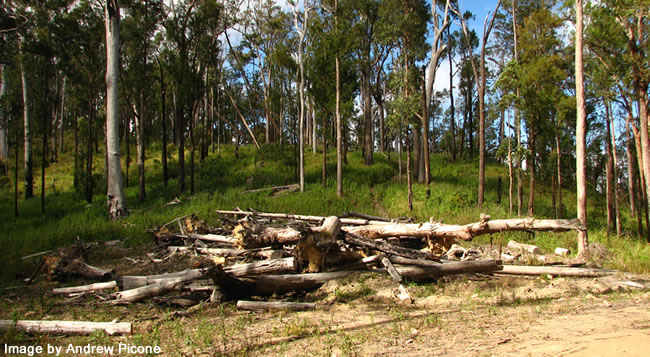Ecolibrium - Logging Threats
Friday 8 March 2013

Ecolibrium - Logging Threat

The Department of Agriculture, Fisheries and Forestry has decided to re-open our State Forests to logging without public consultation, notice, or regard for ecological values that underpin a $2.3 billion nature based tourism industry.
Conservation groups say according to a leaked letter between the Director-Generals of National Parks and Fisheries & Forestry, selected north Queensland ecotone forests will be targeted. This includes native forests from Mackay, Townsville and the Tablelands regions including Kuranda, Eungella, Paluma and Ravenshoe.
These forests, rare ecosystems in their own right, are home to a multitude of rare and threatened species.
This retrograde policy shift will adversely affect threatened species identified under the national Environment Protection and Biodiversity Conservation (EPBC) Act including Cassowaries, yellow-bellied gliders, Eungella honeyeater, spot-tailed quoll, northern bettong and glossy black-cockatoo.
Taxpayer-funded destruction of native forests by State Governments does nothing to support a robust regional economy. By re-opening public native forests to logging the Queensland government is effectively undercutting the plantation and farm-forestry sector. In all other states, native forest logging cannot survive without heavy government subsidies, but we do not see this same level of support for well managed and sustainable plantations.
Pictured: State forests degraded by logging on the Atherton Tablelands.
The Australian Forestry Standard has little national or international credibility. Despite assertions by Minister McVeigh that it has delivered robust forest management, it is in fact a forest industry system used to justify clear-fell logging in Tasmania.
The Forest Stewardship Council’s (FSC)’s certification is the only internationally recognised and credible forestry standard. Both in Australia and abroad, sustainable plantation forestry is increasingly surpassing native forest logging in certification under the FSC’s scheme. FSC certified products are commonplace in a variety of retail outlets.
The Queensland Government made a commitment to the State-wide Forests Process in 1999 to bring an end to all logging in native forests by 2024. This decision was based on both economic and environmental considerations.
With a history of over-harvesting and a legacy of government over commitment; the remaining timber resource is no longer viable to harvest. Not to mention the loss of tree-hollows for species like the yellow-bellied glider.
Forests provide our communities with important ecological services and economic opportunities such as nature-based tourism, and plantation forestry provides a more sustainable future for our state than native forest logging ever can. Further, biodiversity conservation is critical in its own right.
Mr McVeigh also suggests that protecting native forests from logging will lead to increased imports of illegally logged timber from the Asia-Pacific region. This assumption is fundamentally flawed.
In 2012 the Commonwealth introduced the Illegal Logging Prohibition Act that served to prohibit the importation of illegally logged wood products from the Asia-Pacific region.
Australia has a strong and increasingly valuable plantation timber industry, which can meet Queensland’s timber needs. This short-sighted policy shift will only waste taxpayer dollars and will further degrade already stressed ecosystems if implemented. It is also another good reason why the Commonwealth should not divest control to State governments for implementation of the EPBC Act, as big business and the Queensland government continue to call for.
Andrew Picone is the Northern Australia Program Officer for the Australian Conservation Foundation, Cairns.
